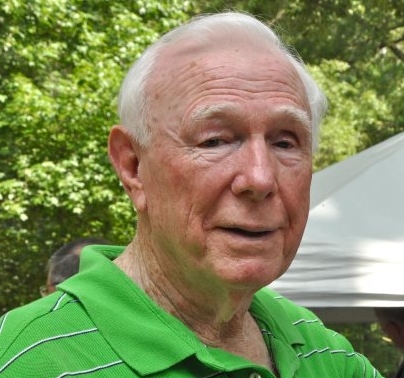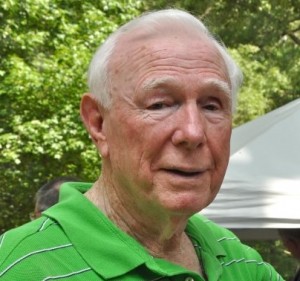July 23, 2012
By John Howell Jr.
Bible students cherish the Book of Esther because it allows us to look past the surface of life and see how God works behind the scenes to accomplish His purposes. In Esther, we are reminded that our God works out, in time, innumerable intricate circumstances as he orchestrates the lives of kings and paupers, believers and unbelievers—and the details of your life and mine. At Ikthoos Camp 2012, a group of staff members and approximately 110 campers had the privilege of seeing the hand of God at work in unmistakable ways.
On Tuesday night, July 17, at around 11 p.m. our Camp Director finished laughing and visiting with fellow night owls in the dorm lobby, and hobbled off to bed, as he had done hundreds of times before at camp during the past 45 summers. The campers and staff members were at breakfast the next morning, Wednesday, July 18, in the East Mississippi Community College cafeteria when Nap’s daughter, Susan, discovered that Nap had gone to be with the Lord Jesus Christ, whom he loved dearly. His body, nestled under the covers peacefully, was in that simple dorm room, soon to be surrounded by his widow, Dixie; his daughter, Susan (another daughter, Stephanie, would soon be on the scene after a quick trip from Atlanta to Scooba, Mississippi); and some of his “boys,” who were actually middle-aged (to put it nicely) preachers who had been launched into the ministry by this country preacher’s simple, accurate gospel message. Just as obviously as God in approximately 500 B.C. orchestrated the complex, seemingly impossible series of events that would make Esther the queen of a worldwide kingdom, our Father clearly orchestrated the events that set the stage for Nap Clark’s physical death in south Mississippi, in 2012 A.D.
Think about it: Nap was determined to make it to camp despite very poor health in the weeks before the July camp (a sweltering time in Mississippi!). He made it to camp all right, and when my family arrived Monday morning Nap was perched at his usual spot in the lobby, handing out the big hugs for which he is known, but slowly and more quietly this year. Nap had been dealing with hospitalization and a variety of health problems. Also on everyone’s minds was the fact that Nap was pushing a five-year window following the removal of his left eye due to a melanoma. Against significant odds, he made it to the podium on Tuesday night for Ikthoo’s 7 p.m. “rally,” gently assisted by daughter Susan. Tears streamed down my wife’s face as we watched him struggle to walk, see, read, speak and write—pretty much all the simple tools he needed for his powerful calling to preach the gospel of grace. Nonetheless, he made it through his message! And the 150 staff members and campers were enthralled. Many of us realized at this moment, we would discover when reflecting later, that we knew Nap’s teaching days were winding down. His “Timothy,” Dick Hill, was privately agonizing over how to counsel and console Nap on this very issue. But on this final lesson, Nap shakily drew out the cross with the upturned arrow at the bottom signifying the resurrection. He wrote out the name “Jesus Christ,” though he had difficulty writing the letters on the projector sheet, and explained how the names had deep meanings, in keeping with Jewish culture. He clearly and firmly explained how Jesus Christ came to die on the cross for all of our sins. Then came the simple offer from God’s Word: believe on the Lord Jesus Christ, and you will be placed into the forever family of God. Then he drew out his beloved “circles,” which he for decades had used effectively to illustrate the Bible’s message of eternal security, the joy of fellowshipping with Christ (“two fellas in the same ship”), and the chastening and loss of joy that comes with getting out of fellowship with Christ, along with a few other critical Bible doctrines unleashed by God for this age of grace. Though it wasn’t his full “circles” presentation, he invited campers to grab as many copies of his full illustration (that he had placed at the exits) as they might need to help them share Jesus Christ with others. It was vintage Nap—including a reminder to us all that no one knows how long each of us will be allowed to live and, thus, the urgency of accepting Christ through faith alone and the urgency of telling others what the Bible says about God’s gift of eternal life through Jesus Christ.
And the next morning, Nap Clark was gone! It wasn’t the rapture, but all of his friends agree Nap had earned the next best thing for him—homegoing during his beloved Ikthoos camp ministry. Though we certainly tried to be sensitive to the family’s loss and the impact on his best buddies while analyzing this amazing week, we collectively could not and do not dismiss the conclusion that God chose to extend Nap and his family a special measure of grace at his appointed time to die. Nap gritted his teeth and made it to camp, with quasi-permission from his doctor. He had fellowship with friends and family (including his grandson who had travelled to Atlanta for the camp) at the cafeteria for two days. He got to that podium Tuesday night to share the gospel with boys and girls and teenagers one more time. He enjoyed the company of his friends and fellow believers one last evening in the lobby. And he got under his covers, went to sleep, and then “went to sleep” (I Thess. 4:13). His body was discovered the next morning by his daughter, and instantly something amazing happened. The best way it can be said is that we realized that God had positioned a support network for Dixie and the family that could not have been scripted with any more love and precision—including experienced pastors and camp staff members who were mentored by Nap, friends, and those little kids and awkward teenagers that Nap and Dixie love. And we all tried to do our part to meet the need.
What about the kids? What do you tell them at a time like this? That is a story all its own. Camp leaders and counselors concealed the matter for a very short period of time, maybe an hour, while we huddled, shed tears, and scripted a plan out of thin air (undoubtedly under the guidance of the Spirit) to meet this dramatic and unusual need. We gathered them in the auditorium, and we told them that Nap had died peacefully in his sleep and gone to be with the Lord Jesus, whom he loves and had faithfully served. Obviously, they were stunned, and hurt, especially the longtime campers and those from his hometown of Starkville. I felt like I had something to say at this moment, because in my job as a school headmaster I had ministered to teenagers during times of loss, and also because there were many on the staff who were much closer to Nap than I, and therefore in more pain and shock and more involved in assisting the family and handling the tidal wave of incoming phone calls. I believe the reason God motivated me to take a week off of work at a busy time in my profession was to be in position to do my part by talking to the older campers.
Teenagers and adolescents deserve truth and love at such a time. Under the intense scrutiny of this group of youngsters, I first carefully explained, in Scriptural terms, what physical death is, as contrasted with the second death. Philippians 4:6-7 is my go-to Scripture when reeling from one of life’s torpedoes or ministering to someone in crisis, so we together rallied behind that the truth of that verse. It reads: “Be anxious for nothing; but in everything by prayer and supplication with thanksgiving let your requests be made known to God. And the peace of God, which passeth all understanding, shall keep your hearts and minds through Christ Jesus.” We gave thanks to God for Nap’s life and ministry. We asked God to provide his peace for the family, and for all of us at Ikthoos 2012. God moved quickly, providing, liberally, his supernatural peace that transcends human understanding, during the remainder of the camp. Next, I went to Romans 1:11-12 and reminded all of us that, even in the case of apostle Paul, Christians need each other for encouragement. So we opened up the microphone and asked campers to share any thoughts of encouragement for each other that might be hitting their minds. Wow, how they delivered! Those teenagers were growing spiritually right before eyes, as if rocket fuel had been applied to their spiritual lives. I remember seven or eight teenagers speaking. They were not just guided by emotions and blubbering (though they had that right considering the circumstances). They had something to say. As these amazing kids came forward, they all began to pull together and confront issues such as our mortality, the truth of the gospel, and the need to share the gospel, “like Nap.” One camper read from Philippians 1:21-24, reminding his peers from Scripture that Paul was “hard pressed” to choose between his desire to be with the Lord Jesus and to continue to minister. What a great passage for the moment! Another camper shared with the group that it was “fitting” that Nap would be at camp when it came his time to die. The kids were understanding what God was doing, too! But it seemed that the main point that they were rallying around was the importance of sharing the gospel, as Nap had committed his life to doing. I can’t imagine any lesson gained by this experience that would have made Nap prouder. Also, it was goose-bump chilling to hear Dixie tell the campers the next day that she was experiencing peace despite the storm, as she thanked the youth for their prayers.
The camp continued through its Saturday conclusion, and the campers and adults had a lot of fun and laughs, at Dixie’s request. This essay includes a few of my observations of an amazing 48 hour period. This essay is not an attempt to speak for everyone’s experience, especially not the family’s, though the family members did express similar conclusions regarding the timing and place of Nap’s death. I am sure that each of the 150 individuals at the camp saw a variety of other clear examples of God’s use of circumstances to accomplish his providential plan in Nap’s death. I am also sure that believers in attendance also recognize they were sent to camp to accomplish some detail or details in God’s plan related to Nap’s finale here on earth. Nap was a champion of the Bible’s message that God has extended grace to sinners through the work of the Lord Jesus Christ. What a joy to see that God extended to Nap a special effusion of grace with which to meet physical death, and placed him at Ikthoos 2012 so that we could see a glimpse of God working out his amazing plan for Nap, and for all of us.
I Corinthians 4:16-5:10


